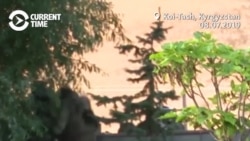Former Kyrgyz President Almazbek Atambaev has been taken into custody on criminal charges of corruption in the 2013 prison release of crime boss Aziz Batukaev. The charges follow two armed raids by security forces on Atambaev’s residential complex outside of the Kyrgyz capital, Bishkek.
The 62-year-old former leader will be in prison until August 26.
In remarks to reporters, Atambaev’s lawyer, Sergei Slesarev, denounced the government’s case as “groundless.” After his August 8 detention at his house in the village of Koi-Tash, Atambaev had been taken to the State Committee on National Security “as a witness,” but had not been questioned, Slesarev alleged.
“This is a scenario that was planned from the start,” he said, the Kyrgyz news site Kloop reported. “These actions are illegal since Almazbek Atambaev, as an ex-president, has immunity [from prosecution].”
The debate over Atambaev’s immunity from prosecution has fueled the former leader’s conflict with the government. Atambaev does not recognize the validity of a parliament vote in late June to end his immunity from prosecution.
He faces charges on several counts involving alleged misdeeds during his 2011-2017 time in office, but attributes the charges to a political vendetta by President Sooronbai Jeenbekov, a former friend from his Social Democratic Party. Atambaev refused three times to honor subpoenas to questioning by prosecutors.
In a bid to bring the ex-president in for questioning, Krygyz security forces on August 8 detained Atambaev after carrying out a second armed raid on his residential complex in the village of Koi-Tash, outside of the capital, Bishkek. An August 7 raid by security forces to bring him in for questioning proved unsuccessful, but cost the life of one serviceman. During both operations, roughly 100 people were wounded.
The security forces on August 8 confiscated two pistols, 13 automatic rifles and sniper rifles, along with 35 accompanying magazines from the residence, according to official information.
Following the ex-president’s detention, Interior Ministry and GNKB troops, equipped with stun grenades and tear gas, dispersed a pro-Atambaev demonstration in downtown Bishkek, not far from government headquarters, Kyrgyz and Russian news outlets reported.
The Interior Ministry states that “citizens in an aggressive mood” broke car windows and committed vandalism in Koi-Tash and burned a village police station in Alamedinsky district.
It describes the current situation as “stable and under control.”
That description carries particular significance now – Kyrgyzstan is hosting a meeting of prime ministers from the Eurasian Economic Union in the town of Cholpon-Ata. Russian Prime Minister Dmitry Medvedev commented on August 8 that “Kyrgyzstan has already met its limit on revolutions in the 21st century, and it will be very undesirable if such events will lead to political and economic instability in the country,” the Russian state news agency TASS reported.
Medvedev said he has talked with Kyrgyz Prime Minister Mukhammedkalyi Abylgaziev and plans to “touch upon this issue” with President Jeenbekov.
On July 24, Atambaev had flown to Moscow on a private plane from a Russian air force base in Kyrgyzstan to discuss the standoff with Russian President Vladimir Putin, who had urged reconciliation between the disputing parties.
Scant sign of that exists. Ahead of the August 8 raid on Atambaev’s residence, President Jeenbekov had declared at a morning session of the Security Council that Atambaev had “blatantly violated the country’s Constitution and laws, putting up a tough armed resistance to the execution of legal investigative activities.” То maintain rule of law and security, “urgent measures” need to be taken, he said.
Returning to Koi-Tash later that afternoon, security forces gained access to the Atambaev residence by using a combination of tear gas, water cannons, and a special vehicle to break down the entrance gate.
When Atambaev’s surrender finally came, it occurred relatively smoothly. “It makes no difference to me: You can shoot me, but don’t touch my guys!” he said to Deputy Interior Minister Kursan Asanov, who oversaw the raid. He went into the residence’s foyer and met Asanov only after the deputy minister had assured him that no one would beat or shoot his supporters.
“Everything will be decided within the framework of the law,” Asanov said.
A member of Atambaev’s staff claimed that more than 2,000 police officers and special forces stormed the residence. Around 300-400 supporters of the former president inside the building put up a residence, barricading the doors with couches and other furniture, the individual said.
Mobile telecommunications in Koi-Tash stopped working and police closed roads to the village.
Atambaev had announced a “non-stop rally” starting in the late afternoon at his Media Forum building in Bishkek, and then plans to march to government headquarters, local media reported. The Media Forum building contains the TV station Aprel, which broadcast Atambaev’s statements about the special-forces operation.
“We’ll go out to the demonstration so that we won’t be considered like sheep,” Atambaev said in remarks to reporters.
He remained defiant toward law enforcement’s attempt to seize him for questioning.
“The general prosecutor is abandoning or doesn’t know the laws: My house is under state protection until a court decision [decides otherwise] and security forces don’t have the right to storm in here.”
The charges against Atambaev involve an April 2013 court decision to release so-called thief-in-law Aziz Batukaev from a Kyrgyz prison eight years ahead of time for supposed health reasons. It later turned out that Batukaev’s claims of leukemia were false.
He currently is in jail in the Russian region of Chechnya on charges of illegal weapons possession and killing a person while driving drunk.
Former Interim Kyrgyz President Roza Otunbaeva, who preceded Atambaev, disagrees with his contention that he has no need to answer prosecutors’ questions about any of the cases against him.
“I consider that he is guilty,” she said in an August 8 interview with Current Time. “I consider that he’s guilty, first of all, of not obeying the law.”
Atambaev served as president from 2011 until 2017 when he became the first Kyrgyz leader to step down from office without being forced out by a revolution.
He went into opposition to the government after several of his close associates faced criminal charges, mainly related to corruption.








Facebook Forum